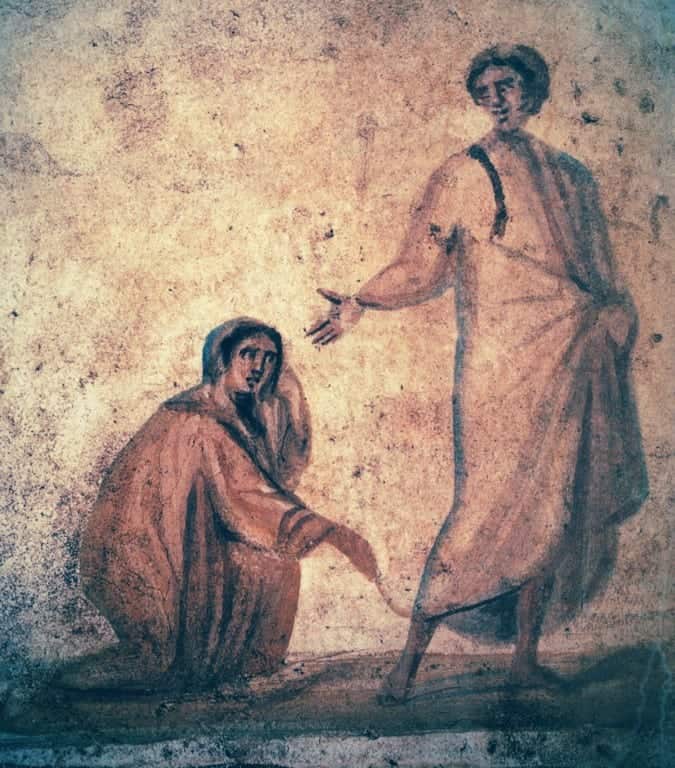August 25 2024: Joshua 24:1-2a, 14-18, Ephesians 6:10-20 and John 6:56-69
Marc Anderson, an American entrepreneur, wrote an essay on artificial intelligence in which he said this: ‘I am here to bring good news: AI will not destroy the world, and in fact may save it’. [The Guardian Magazine, 24 August 2024: why we should fear AI by Yuval Noah Harari]
Those words may well leap out of us: good news and salvation.
The stuff of hope and healing, justice and joy shifting from the realm of creator to the creation’s creation.
For many of us, AI is the impact of Chat GPT and concerns about how to assess essays; or perhaps the worry of a takeover of humanly imaginative endeavours, leaving us with the mundane tasks we’d hoped to jettison.
Rather than seeing AI development as a risk that we should fear, Anderson regards it as ‘a moral obligation that we have to ourselves… to our future.’
Others sound a more cautionary note.
For example, in his book Nexus the historian Yuval Noah Harari looks at the flow of information from the stone age, through the Bible to early modern history to today’s rise in popularism. As he examines the relationship between information and truth, he addresses the choices we face when confronted with non-human intelligence.
How will digital empires impact on our freedom and security he asks? Can we find a hopeful middle ground rooted in shared humanity?
We have always faced such choices: about freedom and agency, power and “powers”. Today’s readings offer wisdom and insight into where we are to find good news and the hope of salvation.
The book of Joshua follows on from Moses’ parting words and begins to trace the history of God’s people as they settled in the promised land. Part of the story includes the mistakes that were made; the things that led to a time of exile - for example worshipping other gods, failing to show compassion and mercy to the vulnerable, seeking human rather than divine rule, exploitation rather than justice.
All this is told with the benefit of hindsight. We glimpse one moment when mistakes are named and faithfulness to God is restored.
The challenges and difficulties of present circumstances are named. The promises, which may have faded from memory, are recalled. The bigger story of freedom and protection is retold.
Remembrance leads to recommitment. Reverence of God leads to service of others.
Faithfulness overtime relies on such moments of renewal: acknowledging what’s gone wrong, recalling moments of blessing with hope, and being intentional about our own priorities or actions - in worship and compassion.
That movement is not always easy.
Last week we were immersed in reflecting on the living bread - and our need to be fed. We recognised that this bread gets inside us and changes us. Yet today, we are confronted by a critical moment of choice.
‘This teaching is difficult, who can accept it?’ says one of those who were following and learning from Jesus. In response, Jesus continues to hold out the promise of his words which give spirit and life. He continues to hold out the promise of his very self.
He also looks around him and asks his own question: ‘Do you also wish to go away?’ Do you go, holding on to the offence; or do you want to choose life this day?
Peter’s response is equally direct and from the heart: ‘Lord, to whom can we go? You have the words of eternal life.’
It is a choice which comes from relationship - just as Joshua and the people recommitted out of their remembrance of being beloved. Peter speaks out of being fed and made whole, forgiven and challenged, taught and embraced. He speaks out of being known and loved.
We know that Peter will still run into misunderstandings; his ego will sometimes get in the way, his boldness will tip into denial. Yet he will also grow in faith - he will run to the empty tomb. He will be recalled, by name, to love and service by his crucified and risen Lord.
In this moment, though, he longs for and reaches out for the intimacy of continuing and deepening relationship with Jesus: of being fed by enriched bread, the bread of life.
In him we glimpse something of the process of faith and faithfulness. Peter continues: ‘We have to believe and know that you are the Holy One of God.’ His commitment is rooted in relationship - in abiding in Jesus. He has come to believe as trust grows mingled with knowledge and experience.
Moment by moment we are invited to live as God’s beloved, forgiven, healed and restored children. We are reminded that God has already chosen us, loves us. And therefore we are invited to choose God’s love in return. By the power of the Spirit, we continue to abide in this love.
Such choosing and abiding is a gift: individually and collectively. This teaching, this commitment, is hard but also life-giving.
This is good news and salvation: hope and healing, justice and joy offered by creation’s creator. Offered as Jesus places himself in human hands - reconciling the world to Godself as he is lifted up on the cross.
Good news and salvation is offered to us as we take the body of Christ into our hands; being fed by the bread of life, so that our lives might reflect his love. We eat and live. Sustained in times of strength and weakness. Serving others out of that same well-spring of limitless love; using our influence, time, resources to bring life to others.
So we come back to the choices we make about our freedom and agency, power and the powers of the world. Our freedom is a great gift of God to creation yet we are so often pulled in different directions; our hearts divided over the desires and opportunities we should pursue.
In Ephesians, those struggles are named - including the external influences and forces at work in the world. Perhaps we might add the technological to the cosmic powers we have to confront. How do we seek after truth rather than controlling information; or respond with caution to tech that we do not understand, for the sake of our moral obligation to creation?
In response we hear of the ‘armour of God’: a visual and memorable shorthand for what God already provides for us as we navigate our world; day by day we choose to be clothed in them. These are things which enable us to hold onto the hope of our shared humanity: reshaping our imagination; being creative with grace; seeking freedom rather than exploitation.
The list begins with truth - the life and love of God revealed in Jesus and at work in us through the power of the Spirit. We are invited to a life not of self-righteousness but one built on right relations; we are to take as shoes whatever makes for walking in ways of peace. All that protects us - the good news of salvation - is obtained in Jesus' life, death and resurrection. To whom can we go? He has the words of life!
The sword is of the Spirit, the word of God: the daily choice of choosing life and hope, joy and peace, justice and compassion. The creator’s gift of salvation to creation - mediated by human lives. As we remember God’s saving acts at this Eucharist, proclaiming the mystery of the gospel, may our faith and faithfulness be renewed in worship and service.
© Julie Gittoes 2024




